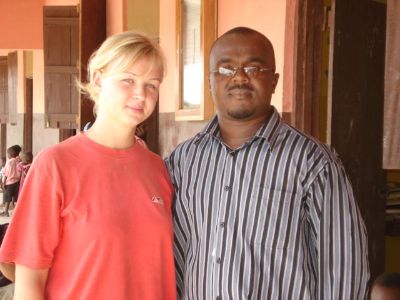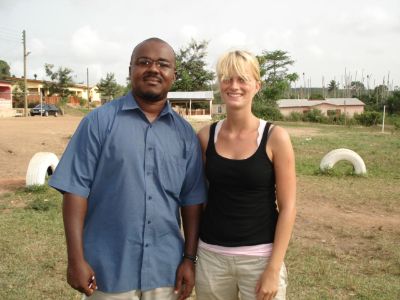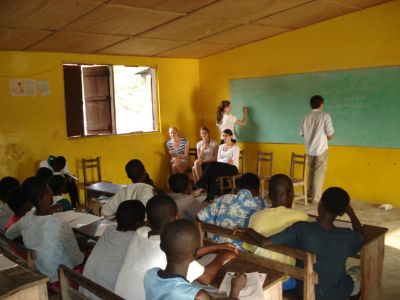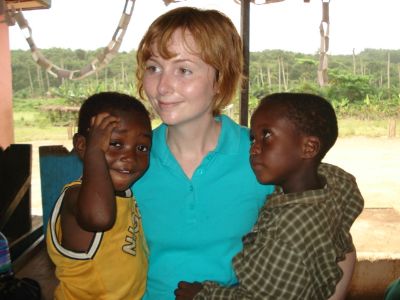| | 
INTRODUCTION
SCR (Save Children's Rights) Volunteer Programs is a subsidiary organ
of New Life International (NLI), Ghana. SCR (Save Children's Rights) is
non-profit program dedicated to the belief that every child in the
world has a right to an education, a safe environment, and love.
Working, Volunteering and sharing ideas whiles living in a foreign land
for extended periods of time becomes the adventure of a lifetime for
many. Many venture to unknown lands to fill a gap of time in their
lives, improve their fluency in a foreign language, meet new and
interesting people, and/or build self-reliance.
Whatever your case, by
traveling and working in a new land, you'll have the chance to immerse
yourself in the culture and meet people on their own terms, rather than
experiencing it as a tourist would. Explore your short-term and
long-term options for working, volunteering, interning or teaching in
unique locations all over the world.
Our mission is to provide
the intermediary block between the likes of new life international
orphanage and the rest of the world to recruit volunteers from in and
out of Ghana to help with developmental projects, especially in
institutions where orphans, abandoned, and destitute children are
housed.
New Life International provides shelter, food,
education, medical care, and clothes for orphans, needy and abandoned
children in the village of Ansapatu, just outside Cape Coast, in
Ghana's Central Region. Our link gives NLI the opportunity to meet
volunteers from across the ocean to interact with children who are
under their care. we also give volunteers the chance to live with
Ghanaian families to experience the culture, language, people and to
impart once knowledge to that family. our prices are moderate; do check
us out
Primarily, the focus of NLI is CARING for CHILDREN and we try to help with their education, social development, medical issues, and shelter provision. for . We have established links with a number of institutions in Cape Coast (schools, orphanages, clinics, libraries etc) where volunteers can choose to work for a specified number of months; three months is the usual amount of time spent doing voluntry work in Ghana.
The purpose of this pack is to let you have a clear understanding of the conditions in Ghana, the activities of NLI and how best we can give you the opportunity to visit Africa, work as a volunteer in your chosen field, experience the people and information on flights to Ghana.
FACTS ABOUT GHANA
Capital: Accra
Population: 22,497,206 (est.) Around 70% live in the south of Ghana.

Ghana Country Information
Ghana is a
fascinating culture at a cross roads between the past and the present.
It is historically rich and amazingly diverse. It boasts the legacy of
the great Ashanti Empire of the 11th century along with the dubious
distinction of being the most traveled route for the transport of
Africans to the new world. The history of Ghana reminds us just how
dynamic events are, with it not mattering how events -good or bad-
begin but the culture that emerges from the coming together of peoples.
Location & Country Facts
The
Republic of Ghana (formerly the Gold Coast) lies on the Gulf of Guinea,
on the western coast of tropical Africa, bisected by the Greenwich
Meridian. The country lies within GMT zone. Ghana extends from 672km
north to south between latitudes 4.5 North and 11 North and from
536km East to West between longitudes 3 West and 1o East. It is
bordered to the West by Cote d'Ivoire, to the North by Burkina Faso, to
the East by Togo and to the South by the Atlantic Ocean. Ghana has a
total land area of 239, 460km2, equivalent to that of Great Britain or
the state of Oregon in the USA. The population of Ghana is
approximately 22 million. The majority of the population is
concentrated in the southern and central part of the country, with
Greater Accra the most densely populated region. The northern three
regions, despite covering more than 40% of the national surface,
support only 25% of Ghana's population.
Capital & Administrative Regions
The
capital of Ghana is Accra, situated on the Atlantic coast about 25km
West of the Greenwich meridian. The current population of Accra is just
under 2 million people. The second largest city in the country is
Kumasi, the former capital of the Ashanti Empire. Ghana is divided into
ten administrative regions: Upper West, Upper East, Northern,
Brong-Ahafo, Volta, Ashanti, Western, Central, Eastern and Greater
Accra. Peoples: Ghana is split between different peoples; the
two largest groups being the Fantis and Ashantis, who live in Central
Ghana.
Climate
Ghana has a typically tropical climate.
Daytime temperatures are high, approaching or topping 30oC on most days
but fall at night. Temperatures are reasonably consistent throughout
the year. The main seasonal factor is rain, which falls almost
exclusively between April-September, peaking in May and June. Another
phenomenon in Ghana is the arrival of the Harmattan winds that blow
from the northeast during the dry season. They bring dust from the
Sahara and reduce visibility to as little as 1km. They generally come
in late November or early December and continue until March.
Famous Ghanaians
Kofi Annan, UN Secretary General 1997-2007
Michael Essien , Chelsea Football Club
Marcel Desailly, Ghana-born French footballer
Paul Boateng, British politician
Kwame Nkrumah, founder of Pan-Africanism
Hugh Quarshie, British Actor
Ama Ata Aidoo, writer
Language
English
is the official national language but there are a total of at least 75
African languages and dialects spoken in Ghana, generally divided into
the Akan, Mole-Dagbani, Ewe and Ga language groups. Twi is the main
Akan tongue and spoken by roughly half the population, including the
Ashanti and Fante.
Religion
Freedom of religion is a
constitutional right in Ghana. It is thought that about 60% of
Ghanaians are Christian and at least 25% Muslim. Minority religions
include various traditional faiths, Bahai, Hinduism and Buddhism. Islam
is the predominant faith in the north, having reached West Africa via
the trans-Saharan trade routes as early as the eighth century AD.
Christianity dominates in the southern and central parts of the
country, with Catholicism first introduced by the Portuguese in the
late 15th century.
People of Ghana
The people of modern
Ghana are generally divided into four main regional groupings, each of
which shares a similar language and culture. The Mole-Dagbani of the
Northern Region were the first to establish their approximate modern
territory, migrating from the Lake Chad region in the thirteenth
century to establish the Mamprusi kingdom at Gambaga. The area to the
east of lake Volta is inhabited by the Ewe, fifteenth century migrants
from eastern Nigeria. Ewe society is the least centralized of any in
modern Ghana and each of the roughly 130 small Ewe chieftaincies is
entirely autonomous. The other important grouping of the east is the
Ga-Adangbe, made up of the Ga people of the Accra coastal plain and the
Adangbe of Ada and Somanya. Like the Ewe, the Ga-Adangbe are originally
from eastern .
Money
The cedi is the unit of currency
of Ghana. One cedi is divided into one hundred pesewas. The present
cedi was introduced on July 3, 2007, and was equal to 10,000 old cedi
when redenomination saw four zeros lopped off the value.
Ghana is
not generally an expensive country in which to stay, but volunteers
should be aware that certain amenities that foreigners are accustomed
too, such as water and imported commodities, are expensive in Ghana. We
strongly recommend that volunteers bring hard currency cash, rather
than travelers checks or credit cards because this is the most easy to
exchange. The best exchange rate is for larger bills. Credit cards are
not widely accepted and obtaining a cash advance is a lengthy process.
If you do bring a credit card, we recommend bringing VISA.

ARRIVING IN GHANA
On the plane:You will be required to fill out an international embarkation/disembarkation card and a custom declaration
card before landing. Remember that volunteering with New Life International
counts “Tourism” for immigration purposes as you will not be paid (and so does not require a work permit.) This card must be returned when leaving the country.
At the airport: One of our representatives will meet you at the arrival lobby of the airport. You will see them as they will be holding New Life International sign. It can be aranged for volunteers who arrive during the day to come straight to Cape Coast but later arrivals will stay in a hotel in Accra and come to Cape Coast the next day. your host family will be introduced to you as well as your work place as you visit
cape coast.
Arrival at Cape Coast: You will meet the family you are staying with and see your place of work. NLI also runs an introductory program, lasting around an hour, in which you will be able to meet other volunteers and get to know about life in Ghana.
TEACHING AND CARING IN GHANA (in places like our Orphanage)
You will be asked to teach classes but can work with small groups of children, if you have difficulty. Children between eight and fourteen years old usually need the most help but you may be asked to help out with other age groups. Teaching areas include MATHEMATICS- WRITING - DRAWINGS- PAINTING- SONGS , ENGLISH. CARING includes- LAYING OF BEDS, PLAYING WITH THE KIDS, KITCHEN, FARM ETC.
ACCOMMODATION
You will stay with a host family, which enriches the cultural experience.
New Life International pays the host family an amount for feeding.
If you feel ill, the family will help you to get medical attention and later inform us.
FOOD
Ghanaian foods are very much exciting. There is fufu with soup, hot kelewele, ginger and jollof rice, vegetable stew with kenkey etc. But if you are missing food from home many restaurants and hotels serve European dishes.
WATER
Sachets and bottles of water can be bought cheaply from town. It is not advisable to drink water from the taps.
HEALTH:
You should visit a travel clinic in your country months before going to Ghana to ensure you have all the correct vaccinations.
Tips for preventing malaria:
Do:
Arrange beforehand to take malaria tablets with a travel clinic in your country.
Use insect repellents, especially those containing DEET.
Bring a mosquito net with you.
Don't:
Expose areas of your skin after sunset.
The doctors in Ghana are very good and any volunteers who have ended up in hospital have been treated well.

OTHER INFORMATION
Clothing: Dressing appropriately in work places is important. For teaching, you should wear smart-casual clothing and sensible shoes.
Internet Cafes: Public computer centers with the internet can be found in town.
Security: Volunteers should remember that they are new in an unfamiliar country. Photocopies should be taken of the relevant document and your passport should be kept safe at all times.
WHAT YOU GET FOR YOUR MONEY
Airport Pick Up:
Upon arrival, a volunteer placement staff will be at the
Airport to pick you up. Please do not forget to send us your flight
information.
First Nights Bed:
You will be spending the first night in Accra the capital
city of Ghana if your flight comes in later than 9:30pm in the
night, before proceeding to the project site the next day.
Transportation to placement:
You will be traveling with our volunteer placement staff by
Car, Cab, Tro-tro (mini-van) or bus to your host family. NLI will be
responsible for one-way transportation to Cape Coast and
volunteers will be responsible for their personal and return travel. Where
your placement demands you travel a distance to and from the house to the place
of work, the volunteer have to pay that cost themselves.
Accommodation:
You will be staying with a host family, within a rented
house or a hostel and volunteer will stay either in a single or shared room.
Our host families are carefully screened and selected base on NLI's requirements.
All our families are middle-class and live in safe neighborhoods. The family
will provide three meals a day usually except on some unforeseen circumstances.
Food:
In most cases your meals are cooked and provided for you
by your host family. You will be getting 3 Meals per day (Breakfast, Lunch and
Dinner) Traditional but very nutritious. If you're a vegetarian or have any
allergies, this is taken into account when we arrange your placement.
24/7 in Country Support & Supervision:
There is volunteer placement staff all over our project
site and the director will also be available to help you when you need it,
including a 24-hour support.
Safety:
Your well being while volunteering with us is our priority. We make sure your trip is safe and our volunteer
placement staff will provide whatever support you may need at any step along
the way.
Administrative Charges:
Our staff works
every day to take care of our volunteers:
Emails are answered; phone calls are taken; coordination occurs between
projects; and most importantly volunteers are placed within areas of their
interest at the center. Although most of our staff works on a volunteer basis,
there are always costs to any organization.
We try hard to keep these administration costs to a minimum so that your money
can be used most effectively. A portion of your money goes to the
children's home as donations
What is NOT Included?
Flight, Airport Taxis, Visa, Immunizations, Personal expenses,
Soft drinks, Mineral Water, Passport, Travel Insurance, Entrance fees and
in-country travel expenses including any excursions the volunteer wishes to
take whiles volunteering .
Host Families will offer meals and lodging from the
first to the last day of the program. Volunteers arriving earlier than the program
start date or staying after the completion of the program may be ask to pay
additional fee for accommodation and food.

| |

